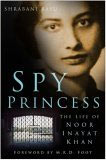London, March 2, 2006
Ranvir Sharma
NRI, Noor Inayat Khan
A book has been released on March 1st, 2006 on the life of 'Spy
Princess' NRI, Noor Inayat Khan, the first female radio operator
of Indian origin to work for Britain during World War II who was
shot dead by Germany's Nazi forces. This book is authored by journalist
Shrabani Basu, the London-based correspondent for the Ananda Bazar
Patrika Group and was launched here last night by Indian High
Commissioner Kamalesh Sharma
When the Germans invade in 1940, Armand persuades Noor to leave
him for her own safety. She flees with her family to England,
but volunteers to serve in a special intelligence agency. She
is trained as a radio operator for the group that, in Churchill’s
words, will “set Europe ablaze” with acts of sabotage.
When Noor Khan’s father, a teacher of mystical Sufism, dies,
Noor is forced to bow, along with her mother, sister and brother,
to her uncle’s religious literalism and ideas on feminine
propriety. While at the Sorbonne, Noor falls in love with Armand,
a Jewish musician. Though her uncle forbids her to see him, they
continue meeting in secret.
Read More
New Book on Noor Inayat Khan
Source: IANS. Image Source: DGL.Microsoft
London, Feb 13: The life and times of Noor Inayat Khan - a descendant
of Tipu Sultan and the only Asian secret agent to work for the
Allied forces during World War II - have been captured in a fascinating
new book to be launched on March 1.
The book, titled "Spy Princess: The Life of Noor Inayat Khan"
(Sutton), is authored by journalist Shrabani Basu, the London-based
correspondent for the Ananda Bazar Patrika Group.
Based on extensive research and interviews with Noor's relatives,
descendants and friends, the book presents a graphic account of
her life till Sep 13, 1944, when she was shot dead by German forces
at Dachau. She was 30.
Born in Moscow, Noor was raised in the Sufi style of Islam and
joined Britain's Special Operations Executive (SOE) during the
war. She was one of three women in the SOE to be awarded the George
Cross and was also honoured with the Croix de Guerre.
Noor was brought up in France and Britain and joined the Red
Cross when World War II broke out. The author writes that "...she
felt she had to do more to oppose the horrors of fascism".
In Britain, Noor trained as a wireless operator before being
recruited by the SOE. Such was the urgent demand for radio operators
that she was sent to France before her training was completed.
Working under the codename Madeleine, she joined a group that
sabotaged communication lines.
But, Basu writes, disaster struck soon and within days her network
collapsed as her colleagues were arrested. Noor was instructed
by her controller, the famous Maurice Buckmaster, to return home,
but she refused to abandon her post as she was the last radio
operator left in Paris.
Basu writes: "For a time she successfully dodged the Gestapo
but by late 1943 her luck had run out. She was betrayed, arrested
and imprisoned at Avenue Foch. Undaunted, she made two dramatic
escape attempts, but was recaptured and sent to Germany. Here
she was interrogated and tortured and finally sent to Dachau where
she was shot.
"The Germans had learnt nothing from her - not even her
real name."

